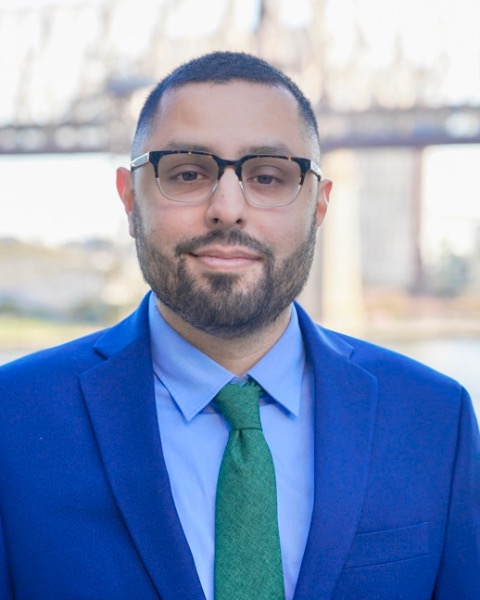Category: LGBTQ+
Symposium 16 - How Social and Structural Determinants of Health Foster Mental Health Inequities among Marginalized Groups
Level of Familiarity: All
Recommended Readings: Downing, J. M., & Rosenthal, E. (2020). Prevalence of Social Determinants of Health Among Sexual Minority Women and Men in 2017. American Journal of Preventive Medicine, 59(1), 118–122. https://doi.org/10.1016/j.amepre.2020.01.007, Hatzenbuehler, M. L. (2009). How does sexual minority stigma “get under the skin”? A psychological mediation framework. Psychological Bulletin, 135(5), 707–730. https://doi.org/10.1037/a0016441, (2020) A Systematic Review and Meta-Analysis of Combination Behavioral Interventions Co-Targeting Psychosocial Syndemics and HIV-Related Health Behaviors for Sexual Minority Men, The Journal of Sex Research, 57:6, 681-708, DOI: 10.1080/00224499.2020.1728514, ,
-

Elliott Weinstein, M.P.H., M.S. (he/him/his)
Predoctoral Psychology Trainee
University of Miami
Miami, Florida -
DP
David Pantalone, Ph.D. (he/him/his)
University of Massachusetts Boston
Boston, Massachusetts -

Gabriel Robles, Ph.D., LCSW (he/him/his)
Assistant Professor
Rutgers University
New Brunswick, New Jersey -
SS
Steven Safren, ABPP, Ph.D. (he/him/his)
Professor
University of Miami
Coral Gables, Florida -
NM
Noelle Mendez, M.S. (she/her/hers)
Graduate Student
University of Miami
Miami, Florida -
DS
David Scales, M.D., Ph.D. (he/him/his)
Weill Cornell Medicine
NEW YORK, New York -
TS
Tyrel J. Starks, Ph.D. (he/him/his)
Associate Professor
Hunter College of the City University of New York
New York City, New York
Chair(s)
Discussant(s)
Presenter(s)
Marginalized populations such as racially and ethnically diverse individuals, sexual minority men (SMM) and people living with HIV (PLWH) experience worse mental health outcomes than the general population. By affecting an individual’s biology and/or behavior, social determinants of health (DoH) – the conditions from which people are born, grow, live, work, and age (e.g., socioeconomic status, access to supportive social networks) – indirectly influence and exacerbate health disparities. Further, social DoH work in tandem with structural DoH (e.g., poverty and discrimination) to further exacerbate health inequities among these minoritized groups. By exploring how social and structural DoH interact to generate and maintain mental health inequities, this symposium will help to combat systemic injustice of minoritized populations in research and clinical practice by identifying facilitators of implementation of interventions to improve mental health outcomes among SMM and PLWH.
Our first presenter assesses how social and structural DoH factors such as race-based stigma, identity-based discrimination, and peer social support affect mental health cross-sectionally among young SMM of color. The presentation highlights how community and peer-based interventions that enhance social connectedness and catalyze meaningful social interactions should be leveraged to address mental health disparities among young SMM of color.
Our second presenter examines how structural barriers such as food insecurity interact with individual-level behavioral health concerns (i.e., depression) to negatively influence antiretroviral therapy adherence among PLWH in a peri-urban settlement in South Africa. This presentation emphasizes the importance of developing multilevel interventions to address both individual social DoH and structural barriers to HIV care among under-resourced PLWH living in South Africa.
The third presenter explores how an additive index of syndemic conditions composed of both social and structural DoH is associated with internalized HIV stigma among a sample of marginalized PLWH. Further, this presentation outlines how social DoH such as age and sexual orientation may exacerbate the effects of these syndemic conditions on internalized HIV stigma to highlight the importance of adapting interventions to curb syndemic conditions for different marginalized groups.
The fourth presenter evaluates the relationship between three domains of mpox-related cognition – collective self-efficacy, risk perception, and optimistic bias – and general mental health outcomes among SMM. This presentation specifically discusses ways to harness community-level interventions that target both social and structural DoH among SMM to mitigate infectious disease outbreaks and mental health disparities.
Our final presenter reviews how social DoH such as relationship status and quality as well as state-level policy at the structural level may predict poor mental health among SMM living across the U.S. This presentation highlights the urgent need for ongoing advocacy to address health inequities as well as the value of cultivating interventions that directly address the impact of stigma on SMM’s close relationships.
Learning Objectives:
- Identify factors consistent with social and structural determinants of health.
- Recognize how social and structural determinants of health negatively affect marginalized groups.
- Incorporate social and structural determinants of health into a syndemic theory framework to explain poor HIV related health outcomes.
- Critique how mental health policy in the U.S. may disenfranchise marginalized groups .
- Assess intervention components that may successfully target social and structural determinants of mental health among marginalized groups.

